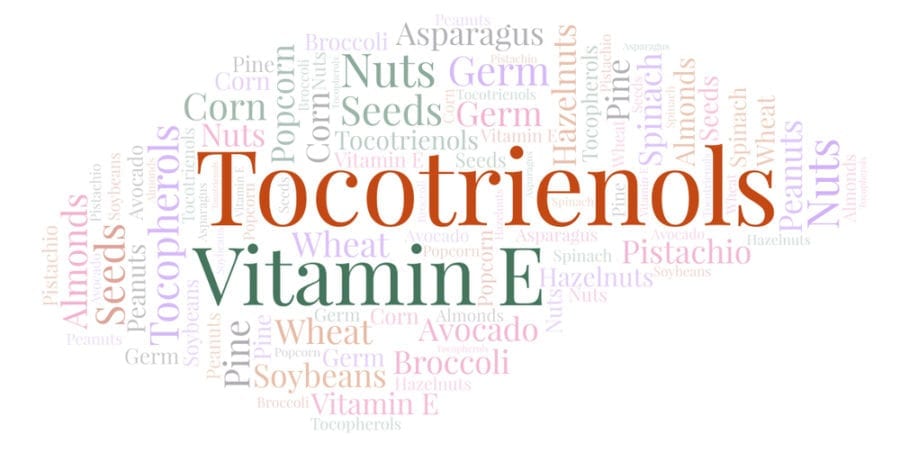Vitamin E is a group of 8 fat-soluble compounds known astocotrienols and tocopherols.
Tocopherols are the better-known of these compounds, and can be found in many supplement products. Tocotrienols, while part of the Vitamin E family, are often overlooked by supplement makers, and can be hard to find.
Tocotrienols are found in nature, but at very low levels. The highest concentration of tocotrienols in food can be found in palm oil and rice bran oil, with smaller amounts in grapefruit seed oil, oats, hazelnuts, maize, olive oil, buckthorn berry, rye, flaxseed oil, poppy seed oil, and sunflower oil1, but you’d need to ingest an entire cup full of palm oil daily to obtain the levels necessary to realize their health benefits. Since diet alone is probably not the answer, PERQUE® products such as PERQUE Lifeguard and PERQUE MitoGuard Plus have included all eight forms of vitamin E since 1987. Look for the term Vitamins E on these PERQUE products.
The healthy benefits of Vitamin E are commonly known with respect to skin, but tocotrienols have healthy effects on many critical functions in the body.
Brain Health
The National Institutes of Health have been funding tocotrienol research at Ohio State University for the last 20 years. In studying injuries due to stroke, Professor Chandan K Sen has shown that having a small number of tocotrienols in one’s neurons confers some protection against stroke injuries. Tocotrienols in the neurons help the brain defend itself from stroke damage and may also improve recovery from stroke.2
Musculoskeletal Health
Epidemiological evidence has shown an association between vitamin E consumption and the prevention of age-related bone loss in elderly women and men. Animal studies show that ingestion of vitamin E, especially tocotrienols, may benefit bone health in terms of maintaining higher bone mineral density and improving bone microstructure and quality.3
Cardiovascular Health
Recently, animal studies supported results found in earlier cell line studies. Animals whose diet was supplemented with gamma- and delta-tocotrienols demonstrated the greatest support for healthy cholesterol levels among all supplements used, whereas alpha-tocopherol had no such effect. In this study, healthy HDL/LDL cholesterol ratios were dramatically supported. The safe dose of various tocotrienols for human consumption is estimated to be 200–1,000 mg/day.4
Getting Enough Tocotrienols
As mentioned above, high quality natural tocotrienol supplements can be difficult to find. Natural tocotrienols are expensive, have higher demand than supply, and, until recent reconfirmation of classic scientific studies from the 1950s–70s, were rarely used except in some pharmaceutical preparations. Fortunately, PERQUE®anticipates and leads by including the safer and more active forms of nutrients all the time and always, unconditionally.
For more information on our products, visit our website at PERQUE.com.
- Ahsan H, Ahad A, et al. A review of characterization of tocotrienols from plant oils and foods. J Chem Biol. 2015 Apr;8(2):45-59. doi:10.1007/s12154-014-0127-8
- Bowden J. Get to know tocotrienols: your brain will thank you later! [Internet]. Los Angeles: BabyBoomster.com. 2018 [cited 2018 Oct 23]. Available from: www.babyboomster.com/tocotrienols-brain-health
- Shen CL, Klein A, et al. Tocotrienols for bone health: a translational approach. Ann N Y Acad Sci. 2017 Aug;1401(1):150-65. doi:10.1111/nyas.13449
- Tan B, Mueller A. How do tocotrienols support heart health?* [Internet]. Big Sandy (TX): A.C. Grace Company. 2017 [cited 2018 Oct 23]. Available from: http://acgrace.com/how-do-tocotrienols-support-heart-health

